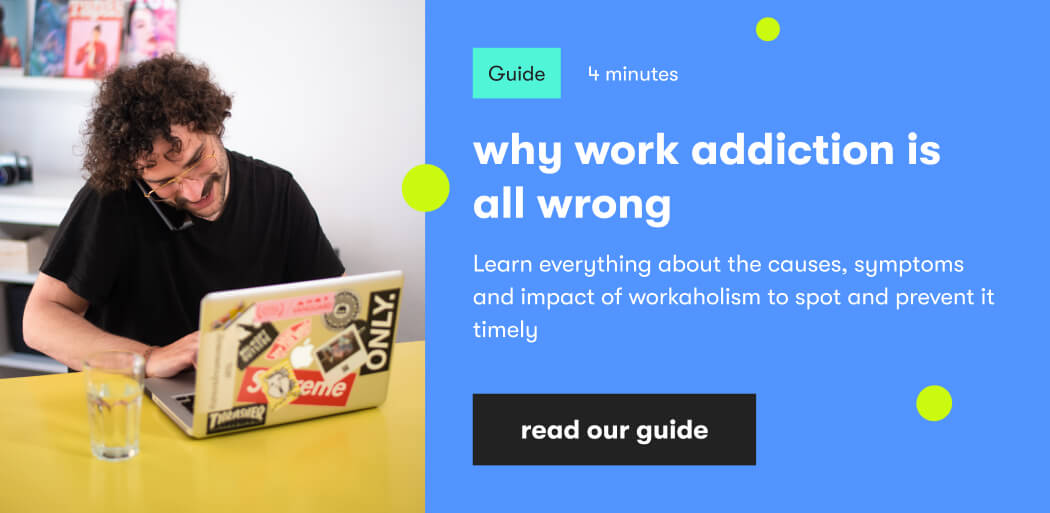How to become a workaholic? That's easy. Workaholism is trending and there is a tendancy to romanticize it. We've decided to share a “Quick start guide into workaholism” for those who want to avoid their problems, gain recognition at all costs, hate all that talk about work-life balance and, most importantly, want to be on trend.
OR, you can run away from these tips as fast as you can to break the cycle ;).
want a more balanced life?
Consider remote-forever jobs at EPAM Anywhere to stay around your family and balance out your work time.
1. Learn how to work long hours
A workaholic's superpower is their knowledge of how to work long hours, overtime, and live at work. Indeed, these skills became second nature. Just imagine - no need to worry about automating your routine tasks or mastering that pesky time management concept! Instead, you can think exclusively about work, enjoy staying late tethered to your laptop, and be the proud owner of the only "online" status in a corporate messenger after business hours...every night.
Knowing how to work long hours means that you don't need to plan any non-work activities, make any personal plans, or waste time hanging out with your friends!
2. Adopt the “poor me” mindset
To learn how to become a workaholic, it helps to adopt a "poor me" mindset. These four rules will help.
- Rule 1: obsess about your position as a victim of poor working conditions that are not ever your fault.
- Rule 2: attribute your overtime, lack of time, and excessive workload, to the lack of human resources.
- Rule 3: remember to blame toxic management for...pretty much everything - perceiving your managers this way will greatly help your “poor me” cause.
- Rule 4: never EVER delegate responsibilities and ALWAYS feel irritated by trivial tasks.
Seems easy? You are on a roll - let’s move to the next tip.
3. Substitute work for real life
Remember when the pandemic hit, and people started to work harder to distract themselves from worrying news and general feelings of panic? Workaholism seemed like a perfect rescue from unsolvable problems.
As the pandemic slowly eases, true workaholics are reluctant to return to normal life - and you can join the resistance to a life outside of work! Use your desire for a promotion, demanding working conditions, or any other work reason you can think of as an excuse for constant overtime. Let work be your cocoon, where you can feel secure, influential, and needed, and forget about everything in the real world - why bother yourself with life, right?
4. Become a workaholic = become a yes-person
Say "Yes!" to tasks that could otherwise be done by your colleagues and subordinates. Surely they wouldn’t do as well as you.
Say "Yes!" to endless multitasking. A growing "In progress" column on a task management board doesn’t scare a savvy workaholic like you.
And say "Yes!" to all of your boss's errands and menial tasks. You don't want to cast doubt on your dedication to work, so refusal isn't an option.
5. Always be the only one in charge
This recommendation takes pride of place in a "How to be a workaholic 101" handbook. Senior-level workaholics spend endless nights at work to feel empowered by fulfilling their tasks. Is there anything in the world quite so enjoyable as checking the list of completed tasks in the middle of the night? Don’t forget to maximize your joy by starting a new project the second you finish this one.
Be a rockstar and a solo player. Never accept help from colleagues, delegate tasks, or allow anyone to do the work instead of you. No team sports or sharing the podium for you, all victory laps should be yours alone!
Being a workaholic: back to reality
Congrats, now you know how to be a workaholic. Before starting to put our phoney tips into action, you should know that workaholism, if it goes to the extreme, is a real issue that can require treatment like psychotherapy or medications. Also, note that workaholism can be associated with chronic stress and burning out.
Joking aside, if you've noticed specific signs of being a workaholic yourself while reading this post, read how to stop being a workaholic where we suggest strategies to end workaholism and balance your life.

Explore our Editorial Policy to learn more about our standards for content creation.
read more


















